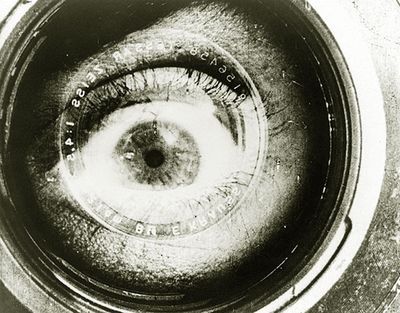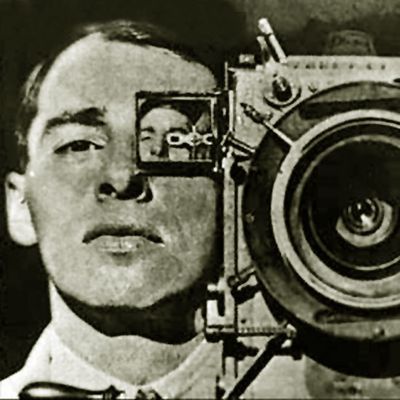Man with a Movie Camera restored

A still from Man with a Movie Camera
By DAVID COLLARD
Is Man with a Movie Camera, a sixty-seven-minute silent film directed by Dziga Vertov in 1929, really the greatest documentary ever made? Yes, at least according to a readers' poll in Sight & Sound magazine. This came as no surprise to cinephiles ��� the film has topped so many lists over the past eight decades that it may be time to declare it hors concours and give some other contenders a chance. It is to documentary film what Ulysses is to the modernist novel and (it could be argued) the two masterpieces share a common approach and aesthetic. They are complex and minutely-detailed explorations of contemporary urban life and monumentally modernist. British audiences can judge for themselves this summer as a digitally restored print tours independent cinemas throughout the country . . . .
Man with a Movie Camera declares in its opening title card (itself a mini-manifesto) that the film was made without a script and contains no dialogue or inter-titles because it aims to offer an ���international absolute language���. This is not just an aesthetic gesture, but an attempt to overcome the daunting communication problems of a country with a vast range of languages and cultures.
The result remains to this day a thrilling and audacious work of art, still fresh, energetic, provocative and wonderfully funny ��� remote from the "tractors and wheat fields" clich��s of later Soviet propaganda. It is an unalloyed pleasure to watch, and re-watch, and not only for film-buffs.
The BFI Blu-Ray reissue features a fine musical accompaniment composed by Michael Nyman, while the big screen release has a score by the marvellous Alloy Orchestra, derived from the director's notes to his original composer, and so perhaps closer to what Vertov had in mind.
The disc comes with many extras, including Vertov's little-known sound film Tri pesni o Lenine (Three Songs about Lenin) from 1934, a slice of Stalin-era propaganda that admittedly features plenty of tractors and wheat fields, but a lot more besides. It was commissioned by Stalin to commemorate the anniversary of Lenin's death and to persuade the Soviet people that he was Lenin's natural heir. It's not as immediately engaging as Man with a Movie Camera and is less likely to appeal to a modern audience, but it is certainly worth a look, not least for its intriguing literary connection.
(A declaration of interest: my chance discovery some years ago of W. H. Auden's long-lost renderings of Russian peasant songs, turned into sub-titles for the first London screening of Three Songs about Lenin, led to an invitation from the BFI to provide an essay for inclusion in the booklet accompanying this release.)
In May 2009, the TLS published my Commentary on the Auden material ��� a bundle of manuscripts, typescripts and shot lists that record a brief collaboration between the poet and the Film Society's Ivor Montagu, a rush job calling for technical know-how which may be seen as a dry run for Auden's rhythmic, metronome-timed commentary for the celebrated Night Mail (1936).
Three Songs about Lenin was last shown publicly in Britain in 2009, at a BFI screening prompted by the rediscovery of the Auden verses. This one-off event was a partial re-creation of the original Film Society programme on October 27, 1935, a typically eclectic matinee that featured some German commercial shorts, a nature documentary about sea urchins, a dazzling abstract film by Len Lye and premieres of two films of lasting importance: Housing Problems, Arthur Elton's seminal study of the effects of poverty, followed by Coal Face (with its Auden madrigal and Benjamin Britten score). Some of these were screened before an expectant modern-day audience settled down to watch the main feature. I had seen it for the first time a few hours before at a trial screening and had been moved to see Auden's subtitles re-united with the original film. But that was in an empty theatre ��� this was in a crowded cinema.
In an early sequence in Three Songs about Lenin a Muslim woman removes her veil and joins a reading class in a village school. There were admiring murmurs in the audience and a ripple of applause as Auden's subtitles blazed on the screen:
My face in a dark prison lay
And blind my life remained
No learning mine nor light of day,
A slave although unchained
Till through my darkness shone a ray,
And Lenin���s truth I gained.
"Dziga Vertov" was the pseudonym of David Abelevich Kaufman, invariably and inaccurately translated by film historians in the West as "spinning top". The term really means "gyroscope" ��� not a nursery toy but, far more resonantly, a piece of kinetic precision engineering, a modern device for the machine age. As the current season of screenings suggests, "Dziga Vertov" runs on.
Peter Stothard's Blog
- Peter Stothard's profile
- 30 followers




